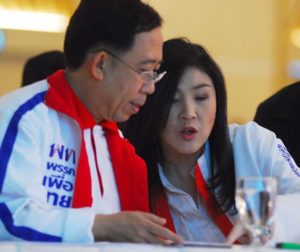 In a recent piece I authored at Dissent Magazine, I remarked about the ever-expanding income discrepancy between the rich and poor that has come to characterize Thailand as the region’s most evident and relevant example of class warfare. Not only were the results of the recent elections last month a manifestation of a nation-state’s proletariat rising up and utilizing their strength in numbers to positively affect political change, but it signals an end to the “business-as-usual” incognizance of the Bangkok elite.
In a recent piece I authored at Dissent Magazine, I remarked about the ever-expanding income discrepancy between the rich and poor that has come to characterize Thailand as the region’s most evident and relevant example of class warfare. Not only were the results of the recent elections last month a manifestation of a nation-state’s proletariat rising up and utilizing their strength in numbers to positively affect political change, but it signals an end to the “business-as-usual” incognizance of the Bangkok elite.
Yingluck Shinawatra was sworn in yesterday as Thailand’s Prime Minister. Several decisions were made right away in an exordium of gratitude to the poor, rural majority which swept Yingluck into office on a tidal wave of popular discontent. Firstly, fresh new tax cuts in the country’s energy sector will have the desired effect to reduce prices for consumers. Moreover, the government appears it will be more inclined to nationalize industries, a welcome reprieve from the failed neoliberal economic policies of Yingluck’s predecessor, Abhisit Vejjajiva. Thailand’s The Nation reports:
“The party made it clear that it will control the Energy Ministry. The minister is someone proficient in energy affairs and he will overhaul the energy price structure, particularly gasoline prices, for fairness to consumers particularly the grassroots who contributed massive votes to the party,” said the Energy Ministry source who asked not to be named.
Additionally, there is talk of creating a baseline for a nationwide daily minimum wage, and more tax cuts will be aimed at businesses to try and fashion the type of macroeconomic stimulus which was so successful under the administration of Yingluck’s brother, Thaksin Shinawatra.
Economists at the World Bank and the International Monetary Fund will doubtless shake their heads, mash their teeth and wail, decrying the loss of foreign direct investment to neighboring countries with less regulated labor practices. The monetary “experts” fail to recognize that this is, however, precisely what the Pheu Thai supporting electorate envisaged when they overwhelmingly catapulted Yingluck from political obscurity to the premiership. More state spending, tax cuts for the poor, and an end to the culture of impunity that hijacked the country’s fiscal policy over the last three years. Maybe the United States could take a lesson – I don’t see Thailand’s credit rating being downgraded anytime soon.